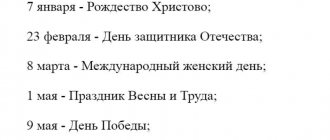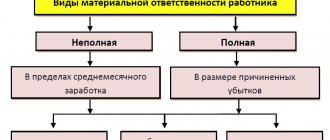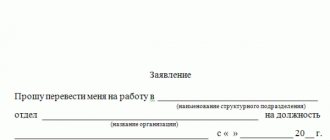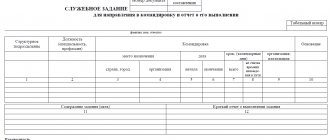Forced absenteeism under the Labor Code of the Russian Federation
The provisions of the Labor Code do not directly define the term “forced absenteeism.” At the same time, modern judicial practice and decisions of the State Labor Inspectorate (SLI) define forced absenteeism as the absence of an employee from work due to circumstances beyond his control. In other words, absenteeism is considered forced provided that the employee was absent from work due to the fault of the employer or third parties.
Common examples of forced absenteeism are the absence of an employee from the workplace for the following reasons:
- illegal dismissal;
- preventing an employee from performing official duties without explanation;
- illegal actions of third parties, as a result of which the citizen was unable to arrive at the workplace and perform official duties.
Reasons for forced absence
There is no such concept as “forced absenteeism” in the Labor Code of the Russian Federation. There is such a thing as “absenteeism due to the fault of the employer.” That is, the labor inspectorate or the court, when considering materials about illegal dismissal, decide whether the absence of working time was due to the fault of the employer or not.
Based on practice, forced absence from work can be defined as a situation where an employee was unable to perform his job functions and responsibilities due to the fact that the employer violated his labor rights by terminating his employment relationship in violation of the norms of current labor legislation.
Such absenteeism can occur both through the fault of the employer and through the fault of the employee himself. Although in the latter case we will talk about simple absenteeism and the reasons for its occurrence.
The procedure for recognizing absenteeism as forced
In general, an employee’s absence from work is recognized as forced absence on the basis of a corresponding decision of the State Labor Inspectorate or in accordance with a court decision.
In case of illegal dismissal or in connection with denial of access to the workplace without explanation, a citizen has the right to appeal to the labor commission. The filing period should not exceed 3 months from the moment the employee learned of a violation of his or her labor rights. In case of illegal dismissal, the application period is reduced to 1 month.
The State Tax Inspectorate considers the applicant’s appeal in the prescribed manner. If a citizen has provided compelling arguments (including documentary ones) for his own claim, the State Tax Inspectorate satisfies the applicant’s demands and makes a decision recognizing the absence as forced, and the period of absence as payable.
If claims for illegal dismissal are satisfied, the State Tax Inspectorate makes a decision to reinstate the employee in the workplace. In this case, forced absenteeism subject to payment is recognized as the period from the moment of illegal dismissal to the day of reinstatement at work.
A citizen has the right to defend his labor rights in court if:
- The State Tax Inspectorate did not satisfy the employee’s claims and did not recognize the absence as forced;
- The deadline for filing a claim with the State Tax Inspectorate has expired.
In each of the listed cases, a citizen can draw up a statement of claim and submit it to a district court of general jurisdiction. Consideration of cases of illegal dismissal (suspension from work) is carried out within the framework of standard judicial proceedings. If a decision is made in favor of the plaintiff, the period of absence of the employee from work is recognized as forced absence.
Forced absenteeism under the Labor Code in 2020
Determining the time period (term)
The period of forced absence is calculated quite clearly and logically. To do this, we take the calendar period between the date of dismissal of the employee and the date of the decision by the court or other body that protects the labor rights of citizens.
To calculate the time of absence from work, we need to know the date of dismissal and reinstatement.
The person was fired on May 11, 2020. The court decision on his reinstatement was made on December 29, 2016. The period between these dates is forced absenteeism. In the process of calculating the period of forced absence, it is necessary to determine how many working days there were during this time.
So, from May 12 (the date of dismissal is a working day) to December 31, 2015, there are 186 working days.
From January 1 to December 29, 2016 there were 298 working days.
The total period of temporary absenteeism of the employee is: 186 + 298 = 384 working days.
Payment
Calculation of average earnings
The accounting rules for determining the average income of an employee per day are enshrined in Art. 139 of the Labor Code and the Russian Federation and the norms of the Decree of the Government of the Russian Federation dated No. 922 of December 24, 2007.
It is necessary to take into account the following types of income of a person:
- bid;
- bonus;
- surcharges.
The calculation does not include income from benefits and pension payments.
To determine the amount, the person’s entire official earnings for the year before dismissal are taken.
Penalty for forced absence due to the employer’s fault
What to do if the employer did not pay wages? Of course, payment for time absent due to the fault of management is possible.
There are several ways to recover wages through the court:
- preparation and submission of an application for the purpose of issuing a court order;
- filing a claim in court.
The law allows you to apply both to the court at the location of the enterprise and at the place of residence of the applicant.
After considering the case, the court issues an order or makes a decision stating the need for clear and full compensation of the person’s wages for the entire period.
The right to wages is inalienable.
Compensation for forced absence: grounds
Based on Art. 234 of the Labor Code of the Russian Federation, if absenteeism is recognized as forced, the employer is obliged to pay the employee compensation for the period of absence from the workplace.
The following documents may serve as the basis for payment of compensation:
- writ of execution received by the enterprise from the Federal Bailiff Service;
- a copy of the resolution of the special commission of the State Labor Inspectorate.
Upon receipt by the enterprise, the above documents are subject to mandatory registration (assignment of an incoming number, entry into the log of incoming correspondence), after which the employer carries out the orders contained in the document (reinstatement at work, permission to work, payment of compensation, etc. ).
| ★ Best-selling book “Calculating sick leave and insurance premiums in 2018” for dummies (understand how to calculate insurance premiums in 72 hours) 3000+ books purchased |
Is it the HR employee's fault?
The employee worked in the organization as a human resources specialist; her job function included responsibilities for the development and execution of personnel documentation. In accordance with the provisions of the job description, she was given responsibility for the timely and high-quality performance of job duties. When applying a disciplinary measure to another employee in the form of dismissal, the HR specialist did not fully comply with the procedure for applying a disciplinary sanction established by law. The employee’s violation of the requirements of the law when applying a disciplinary sanction served as the basis for canceling the dismissal order, reinstating the dismissed employee at work and collecting wages from the organization for the period of forced absence.
The employer, having considered that the actions of the HR specialist had caused direct actual damage to him, filed a claim in court for damages in an amount equal to the average monthly earnings of the employee who committed the violation.
The court found the employer's claims to be justified. Due to the improper performance by the HR specialist of his official duties to the organization, direct actual damage was caused, which is understood as a real decrease in the employer’s available property or a deterioration in the condition of the said property, as well as the need for the employer to make costs or excessive payments for the acquisition, restoration of property or compensation for damage, caused by the employee to third parties (part two of Article 238 of the Labor Code). According to Art. 241 of the Labor Code of the Russian Federation, for damage caused, the employee bears financial liability within the limits of his average monthly earnings, unless otherwise provided by the Labor Code of the Russian Federation or other federal laws. Based on the above rules, the court satisfied the employer’s claim.
Appeal ruling of the Krasnodar Regional Court dated December 5, 2020 in case No. 33-42587/2019.
Previously, Rostrud specialists made the conclusion that payments made in favor of an illegally dismissed employee during forced absence were considered direct actual damage.
Letter dated October 19, 2006 No. 1746-6-1. Krasnoyarsk Regional Court (ruling dated October 31, 2012 No. 33-9404).
How to calculate compensation for forced absence
In accordance with Art. 396 of the Labor Code of the Russian Federation, the amount of compensation for forced absence is calculated based on the employee’s average earnings for each day of absence from work.
Below are step-by-step instructions that will help the employer understand the features of calculating compensation for forced absence.
Step 1. Determining the period of forced absence
The period of forced absence, subject to payment based on average earnings, is determined in working days. When reinstated at work after illegal dismissal, the first day of forced absence is considered to be the working day following the dismissal, the last day is the working day preceding the day the employee is reinstated at work.
If absenteeism is associated with an unreasonable refusal of an employee to work, then the period subject to payment is calculated based on the number of working days during which the employee was actually absent from the workplace and did not perform job duties.
Let's look at an example . Yuryev S.D. – worker of the 3rd brigade of production workshop No. 5 of Stat Prom LLC.
On October 15, 2020, Yuryev was suspended from his official duties. Yuryev was not allowed to work without explanation, on the verbal order of the workshop foreman. There are no documents justifying Yuriev’s removal from work. In this regard, Yuryev appealed to the State Tax Inspectorate with a complaint against the employer due to illegal dismissal from work.
On November 1, 2020, a copy of the decision of the GIT on the need for Yuryev’s immediate admission to work, as well as payment of compensation for the period of forced absence, was received at the postal address of Steel Prom LLC. On the same day (11/01/2020), Yuryev was allowed to work.
Yuryev was actually absent from work from October 15, 2020 until November 1, 2020, so the management of Stal Prom LLC is obliged to pay compensation to the employee in the amount of average earnings for 11 working days.
Step #2. Determining the billing period for average earnings
The calculation period for determining the amount of average earnings for compensation is 12 months preceding the month of forced absence. For example, if an employee was absent from work due to forced absence from October 17 to 18, 2020, then the billing period will be October 1, 2017 – September 30, 2020.
If the period of forced absenteeism includes several months (for example, from October 17 to November 1, 2020), then the reporting period is defined as the 12 months preceding the month the forced absenteeism began (October 1, 2017 – September 30, 2020).
Periods of absence from work due to personal leave, temporary disability, business trips, and parental leave are not included in the calculation period.
How to calculate the amount of recovery for forced absence?
“According to Article 392 of the Labor Code of the Russian Federation, an employee has the right to go to court to resolve an individual labor dispute, including a demand for recovery of wages for forced absence and compensation for moral damage, within three months from the day he learned or should was to find out about the violation of his right, and in disputes about dismissal - within one month from the date of delivery of a copy of the dismissal order to him or from the date of issue of the work book.
Article 391 of the Labor Code of the Russian Federation provides a list of individual labor disputes directly considered in courts of general jurisdiction based on applications from employees, such as: reinstatement at work regardless of the grounds for termination of the employment contract, changing the date and wording of the reason for dismissal, transfer to another job, payment for the period of forced absence or payment of the difference in wages for the time of performing lower-paid work, unlawful actions (inaction) of the employer in the processing and protection of the employee’s personal data and individual labor disputes.
According to Part 2 of Article 394 of the Labor Code of the Russian Federation, upon reinstatement at work, the employee is paid for the time of forced absence.
Average earnings for calculating payment for forced absence time are determined in accordance with Article 139 of the Labor Code of the Russian Federation and the Regulations on the specifics of the procedure for calculating average wages, approved by Decree of the Government of the Russian Federation of December 24, 2007 N 922.
The calculation of average earnings, regardless of the mode of work, is made based on the wages actually accrued to the employee and the time actually worked by him for the 12 months preceding the moment of payment. The collective agreement may also provide for other periods for calculating average wages, if this does not worsen the situation of employees.
The amount of payment and the period for which the amount is paid must be indicated in the court decision and writ of execution. This amount can be reduced by the amount of severance pay paid to the employee upon dismissal.
It should be taken into account that payments for the period of forced absence are made simultaneously with the issuance of an order to cancel the dismissal. As the Supreme Court of the Russian Federation indicated, the meaning of the reinstatement procedure is precisely to cancel the legal consequences of dismissal by canceling the dismissal order (and not by issuing an order for reinstatement after the court makes a corresponding decision). Consequently, the employer’s obligation to pay wages during forced absence occurs simultaneously with the cancellation of the dismissal order and the restoration of the employee to his previous position. This payment is an integral part of the reinstatement process.
The employer cannot independently reduce the amount ordered by the court. The salary that an illegally dismissed employee received in another organization or in an employment service as an unemployment benefit does not reduce the amount of payment for the time of forced absence (clause 62 of the Resolution of the Armed Forces of the Russian Federation of March 17, 2004 N 2). Therefore, the employer cannot reduce the amount of wages during forced absence by amounts received by the employee at another job.
Labor legislation, along with the employer’s responsibility for compensation for material damage, also defines its responsibility for compensating the employee for moral damage.
According to Art. 237 of the Labor Code of the Russian Federation, moral damage caused to an employee by unlawful actions or inaction of the employer is compensated to the employee in cash in amounts determined by agreement of the parties to the employment contract. In the event of a dispute, the fact of causing moral damage to the employee and the amount of compensation for it are determined by the court, regardless of the property damage subject to compensation.
Moral harm is that the employee experiences moral suffering due to a violation of his rights.
In order to ensure the correct and uniform application of the legislation regulating compensation for moral damage, the most complete and rapid protection of the interests of victims when courts consider cases of this category, the Plenum of the Supreme Court of the Russian Federation in Resolution No. 10 of December 20, 1994 “Some issues of application of legislation on compensation for moral damage” harm" gave an appropriate explanation.
Judicial practice in recent years demonstrates a steady trend towards an increase in the number of claims for compensation for moral damage presented by employees in labor disputes. Despite this, in the Russian Federation there are still a number of obstacles to the formation of uniform judicial practice in this category of cases.
The concept of moral damage is absent in the Labor Code of the Russian Federation. However, taking into account the fact that compensation for moral damage within the framework of labor relations is part of the general concept of compensation for moral damage, when defining this concept one should be guided by Art. 151 of the Civil Code of the Russian Federation, according to which moral harm is the physical or moral suffering of a citizen caused to him by actions that violate his personal non-property rights or encroach on other intangible benefits belonging to the citizen.
Accordingly, in relation to labor relations, moral harm is the physical or moral suffering of an employee associated with the unlawful behavior of the employer, which can be expressed both in the form of action and inaction.
The presence of physical and moral suffering caused by unlawful actions or inaction of the employer must be proven by the employee. Evidence may include, for example: illness, moral suffering caused by the loss of a job and the inability to find another, the inability to find a job, to obtain unemployed status due to a delay in issuing a work book, a delay in wages that put the employee in a difficult financial situation, etc.
As a general rule, the obligation to compensate for moral damage is assigned to the employer if he is guilty of causing moral damage. Exceptions to this rule are stipulated by law, namely Art. 1100 of the Civil Code of the Russian Federation, which lists cases where compensation for moral damage is carried out regardless of the guilt of the harm-doer, which, in particular, includes causing harm to the life or health of a citizen by a source of increased danger.
The Labor Code of the Russian Federation clearly defines only two cases when an employee has the right to demand compensation for moral damage. This is the right to demand compensation for moral damage in case of discrimination in the sphere of labor (Article 3 of the Labor Code of the Russian Federation) and in cases of dismissal without legal grounds or in violation of the established procedure for dismissal or illegal transfer to another job (Article 394 of the Labor Code of the Russian Federation).
Thus, by Decree of the Supreme Court of the Russian Federation dated January 25, 2008 No. 5-B 07-170, M.’s claims were satisfied in terms of declaring the dismissal order illegal, reinstatement at work, recovery of wages for the period of forced absence, compensation for moral damage, since termination employment contract under clause 2 of Art. 278 of the Labor Code of the Russian Federation is not a measure of legal liability and is not allowed without payment of fair compensation, the amount of which is determined by the employment contract, and in the event of a dispute, by a court decision.
However, the Plenum of the Supreme Court of the Russian Federation in Resolution No. 2 of March 17, 2004 “On the application by the courts of the Russian Federation of the Labor Code of the Russian Federation” (Resolution No. 2) on the issue of compensation for moral damage to an employee explained the following: given that the Labor Code of the Russian Federation does not contain any restrictions for compensation for moral damage and in other cases of violation of the labor rights of workers, the court by virtue of Art. 21 and 237 of the Labor Code of the Russian Federation has the right to satisfy the employee’s request for compensation for moral damage caused to him by any unlawful actions or inaction of the employer, including in case of violation of his property rights (for example, in case of delay in payment of wages).
Thus, the employee can demand compensation for moral damages in all cases of unlawful behavior of the employer, including in connection with dismissal without legal grounds, illegal transfer to another job and imposition of disciplinary action, delay in payment of wages.”
Compensation payment deadline
Based on Art. 396 of the Labor Code of the Russian Federation, the decision to reinstate an illegally dismissed employee is subject to immediate execution. Guided by this provision, one can also recognize the employer’s immediate obligation to calculate and pay compensation for forced absence - no later than the day the order for reinstatement is issued.
A sample order can be downloaded here ⇒ Order for reinstatement at work by court decision.
If we are talking about payment of compensation for forced absenteeism associated with being denied access to the workplace, then in this case it is advisable to assume that the period for payment of compensation should be determined by the day the employee is actually admitted to work, namely no later than the day following the day he enters the enterprise relevant writ of execution (writ of execution or decision of the State Tax Inspectorate).
What is meant by “forced absenteeism”?
As was indicated, there is no clear concept of what forced absenteeism is in the Labor Code of the Russian Federation.
According to established practice, the essence of this concept is that a person had a real opportunity to perform his official duties, but was limited in this due to the dishonesty of the head of the company. Examples of such actions by a boss are:
- dismissal from a position or transfer to another place in cases where the employer did not have such a right;
- unreasonable refusal to hire an organization;
- signing a work agreement in violation of the established terms of conclusion;
- failure to timely comply with the requirements of a court or other authorized authority to reinstate a worker in his position;
- incorrect reason for dismissal, for example, incorrect wording in the relevant order of the manager, if this caused the impossibility of employment in a new place;
- delay in issuing the employee’s personal work book;
- failure to pay due amounts upon final settlement.
These reasons create some obstacles for a person. They arise through no fault of the employee, and are therefore considered a forced break.
Unlawful suspension or dismissal
From the content of the norms of the Labor Code of the Russian Federation it follows that forced absenteeism due to the fault of the employer can occur if there has been a temporary suspension or dismissal from a position in violation of the requirements of current norms.
Removal, like dismissal, is mainly possible in cases where the worker violated his official duties, that is, partially did not fulfill or completely withdrew from performing them.
Such cases include:
- absence from one's place without good reason for more than four hours in a row or the entire day;
- consumption of alcohol or illegal drugs or appearance on the territory of the organization under the influence of these substances;
- violation of internal security rules;
- communication of restricted access information to unauthorized persons;
- theft, damage or loss of entrusted material assets of the company.
There are other reasons why a person may be suspended from work or fired altogether.
Regardless of the circumstances, it is necessary to conduct an inspection and document the fact of violation in order to have evidence on hand.
If this is not done, then any break in professional activity will be considered forced.
Late execution of the decision on reinstatement at work
According to the rules of the Labor Code of the Russian Federation, forced absenteeism can occur in a situation where the manager has not complied with the requirements of a court opinion or a decision of another authorized body to reinstate the worker in his position.
According to the current general rules, an employee can be reinstated to his previous place by a court decision.
It is not uncommon for people to be fired from their jobs without justifiable reasons. A worker can also leave if he disagrees with some of the manager’s actions, for example, in the case of an illegal transfer. In such circumstances, people most often turn to the court or other authorized body for reinstatement in their previous position.
After a formal investigation, the competent authority always issues its opinion. If the issue is resolved in favor of the worker, the decision is not only handed to the person, but also sent to the organization where he worked.
In conclusion, the time period within which the person’s demands must be fulfilled is always indicated.
If the manager does not implement the decision on time, then forced absenteeism automatically occurs. It should be noted that a delay of this kind is also recognized as a failure to comply with a court decision. In this case, criminal measures may be applied to the manager.
Delay in issuing work book
Forced absenteeism due to the fault of the employer also occurs in the event of a violation of the deadline for issuing a work book to a person.
According to current standards, upon dismissal, on the last day of work, a person must be given a work book with a record of dismissal entered in it.
If for some reason a person is absent on the day of dismissal, the manager is obliged to send him a notice of the need to appear to receive the specified document.
After sending the notice, it is considered that the manager has fulfilled his obligation. The timeliness of issuing such a document is due to the fact that without it it will be extremely difficult to get a new job, since the presentation of a work record book is a prerequisite for employment.
Quite often, even before leaving, a person is looking for a new job and immediately after leaving he can get a job again. If he doesn’t have the book in his hands, he may lose this opportunity. Accordingly, his activities will be interrupted due to the manager’s dishonesty and a period of forced break will occur.
Payment for forced absence upon reinstatement
In case of illegal dismissal at the initiative of the employer, the person has the right to go to court to challenge the current situation. After considering the case, the judge decides whether the suspension from work and the dismissal procedure were lawful.
If the decision is in favor of the employee, he returns to his previous place of work in his position. Reinstatement at work is being processed, not rehiring. The employment relationship is not considered terminated. Moreover, the entire period of time while the employee was absent is subject to compensation.
Situations in which forced absenteeism occurs
The inability to perform work duties, which are interpreted as forced absenteeism (AF), arises as a result of the actions of the employer:
- Unreasonable removal from duties, transfer or dismissal of an employee.
- Failure to comply with the procedure for registering dismissal in the event of an employee’s violation of labor discipline, staff reduction and other grounds for the employer’s initiative.
- Indication in documents of unreliable grounds for termination of the employment contract.
- Late issuance of a work book upon dismissal.
- Delays in the execution of a court decision to reinstate a person at work.
The employer's actions force the employee to commit absenteeism - staying at the workplace for more than 4 hours in a row or for a longer period of time.









